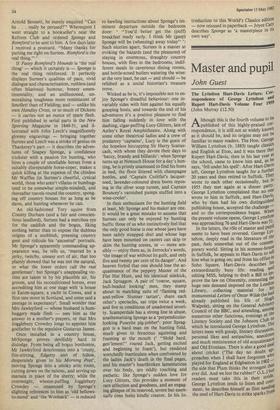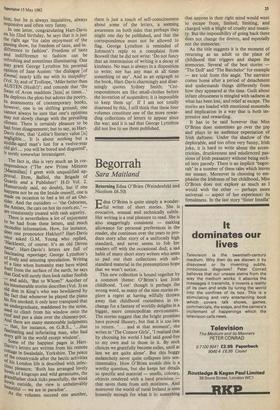Master and pupil
John Guest
The Lyttelton Hart-Davis Letters: Cor- respondence of George Lyttelton and Rupert Hart-Davis Volume Four 1959 (John Murray £12.50) Although this is the fourth volume to be published of this highly-praised cor- respondence, it is still not as widely known as it should be, and its origins may not be familiar to many readers. The Hon. George William Lyttelton (b. 1883) taught classics and English at Eton, and it was there that Rupert Hart-Davis, then in his last year at the school, came to know him and, as he says, 'fell under his spell'. After Hart-Davis left, George Lyttelton taught for a further 20 years and then retired to Suffolk. TheY wrote to each other occasionally, but In 1955 they met again at a dinner party' George Lyttelton complained that no one wrote to him in Suffolk, and Hart-Davis, who by then had his own distinguished publishing house, accepted the challenge -- and so the correspondence began. When the present volume opens, George Lyttelton was approaching 76 and Hart-Davis was 51.. In the letters, the role of master and panil seems to have been reversed. George Lyt- telton, deeply read in the literature of the past, feels somewhat out of the content- porary world. Sitting in his summer-house in Suffolk, he appeals to Hart-Davis to tell him what is going on; and from his office in Soho Square, Hart-Davis describes hi, extraordinarily extraordinarily busy life: reading and editing MSS, helping to draft a Bill to 151" prove the law on Obscenity, contesting the huge rate demand imposed on the London Library, collecting material for 111.s, monumental Letters of Oscar Wilde (he had already published his life of Hugh Walpole), sitting on the General Advisory Council of the BBC, and attending, among numerous other functions, evenings at the Literary Society and the Johnson Club to which he introduced George Lyttelton. The letters teem with gossip, literary discussion, personal likes and antipathies, anecdotes and much reminiscence of old acquaintance, and Old Etonians. There is also a good deal about cricket (`The day no doubt ap- proaches when I shall have forgotten who played for England at Edgbaston in 1902 the side that Plum thinks the strongest that ever did. And we lost the rubber!' G.L.),b,tit readers must take this in their stride' George Lyttelton tends to listen and corn- ment; he describes himself as flint needing the steel of Hart-Davis to strike sparks front
him; but he is always inquisitive, always responsive and often very funny.
In one letter, congratulating Hart-Davis on his 52nd birthday, he says that it is just the right age 'for calm enjoyment of the passing show, for freedom of taste, and in- difference to fashion'. Freedom of taste and indifference to fashion can be refreshing and sometimes illuminating. One may grant George Lyttelton his personal opinion of Jane Austen: 'the dialogue [of Emma] nearly kills me with its insipidity' (Vol. 3); and of Trollope, 'Miles better than AUSTEN (Hush!)'; and concede that 'the Swan of Avon maddens [him] at times...' He deplores the plots but adores the poetry. In assessments of contemporary books, however, one is on shifting ground; one cannot always be sure that one's opinions may not slowly change with the prevailing climate. There is certainly pleasure to be had from disagreement; but to say, as Hart- Davis does, that Lolita's literary value [is] negligible... It is about nothing but a middle-aged man's lust for a twelve-year Old girl.... you will be bored and disgusted', is surely somewhat intransigent.
The fact is, this is very much an In cor- respondence (`The new Prime Minister [Macmillan] I greet with unqualified ap- proval. Eton, Balliol, the Brigade of Guards and a Publisher!' H-D Vol. 2. Humorously said, no doubt), but if one happens not be on the Inside oneself, one is Made on occasion to feel a bit of an Out- sider. And the outsiders — 'the Osbornes, the Amises, the cats on hot tin roofs etc.' — are consistently treated with rash asperity. There is nevertheless a lot of enjoyment to be had from these letters, and much recondite information. How, for instance, does one pronounce Hakluyt? Hart-Davis ?rice asked G.M. Young who replied, Hacklewit, of course: it's an old Devon Hart-Davis's letters are full of fascinating reportage; George Lyttelton's of lively and amusing speculation. Writing Of a time when humanity may have wiped itself from the surface of the earth, he says that God will surely then look rather foolish and adds, 'But to Whom?' Another of his innumerable stories describes (Vol. 3) an old don in King's who was bewildered by the fact that whenever he played the piano his fire smoked; it only later transpired that an undergraduate, maddened by the noise, used to climb from his window onto the roof and put a slate over the chimney-pot. And there are many memorable judgments that for instance, on G.B.S., ...that fascinating and infuriating man, who had every, gift in the world except wisdom'. Some of the happiest pages in Hart- Davis's letters are written from his remote cottage in Swaledale, Yorkshire. The peace of the countryside after the hectic activities Of his London life is described with infec- tious pleasure: 'Ruth has arranged lovely bowls of kingcups and wild geraniums, the grandfather clock ticks peacefully, the wind L"rls outside, the view is unbelievably ueautiful — we are in paradise'.
As the volumes succeed one another, there is just a touch of self-consciousness about some of the letters, a seeming awareness on both sides that perhaps they might one day be published, and that the correspondence must not be allowed to flag. George Lyttelton is reminded of Johnson's reply to a complaint from Boswell that he did not write: `Do not fancy that an intermission of writing is a decay of kindness. No man is always in a disposition to write; nor has any man at all times something to say'. And as an epigraph to the book, Hart-Davis charmingly and disar- mingly quotes Sydney Smith: 'Cor- respondences are like small-clothes before the invention of suspenders; it is impossible to keep them up'. If I am not totally disarmed by this, I still think that these four volumes constitute one of the more rewar- ding collections of letters to appear since the war; and it is sad that George Lyttelton did not live to see them published.







































 Previous page
Previous page